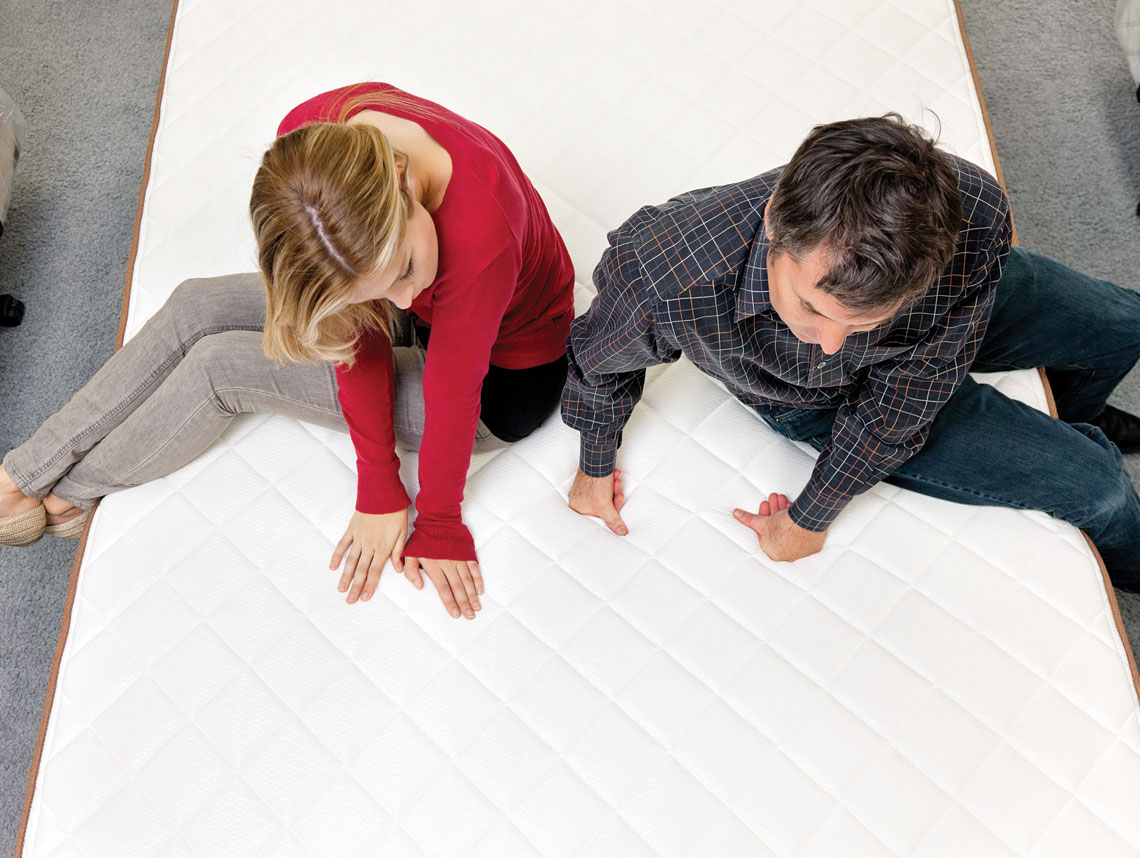
You spend a quarter to a third of your life in bed, so sleeping on the right mattress is key for your health and mental well-being. Unfortunately, buying a mattress can be as stressful as buying a new car.
There are so many models. So many options. So many pushy salespeople. And given that a new mattress can set you back several thousand dollars, it’s no wonder the purchase process can make you lose sleep at night.
As with car buying, though, doing a little research can make you a smarter consumer. So, before heading to a mattress showroom, ask yourself these important questions.
Is it time for a new mattress?
The Better Sleep Council recommends replacing your mattress every seven to 10 years, but this is not a hard and fast rule. The long-term comfort and durability of your current mattress depends on a lot of factors, such as your weight, how many hours you sleep on it (or eat or watch television on it) and how well you take care of it.
I currently sleep on a Simmons Beautyrest mattress that I purchased 17 years ago. Mattress salespeople may hate me for saying it, but it still feels like new. (Really. I haven’t even made any indentations in it.) You’ll know it’s time for a new one when you don’t sleep as well as you used to, or if you’re feeling some aches and pains upon waking.
What type of mattress do you want?
The most common type of mattress is the innerspring mattress. That’s the one with steel coils surrounded by cushioning. Gaining in popularity is the memory foam mattress, which molds to your body and springs back into shape when you get up. Then there’s the adjustable-air variety that lets you and your partner adjust the firmness to your liking.
But how do you know what type of mattress you want without actually going into a showroom? Ask around and find out what your friends sleep on, and see if you can try out their mattresses. This also is how you can determine if you’d like options such as pillowtops.
Do you want to shop in-store or online?
Of course, the majority of mattresses are sold at mattress and furniture stores. Most people want to see and sample the mattress they are going to buy. But purchasing a mattress online also has its advantages. Online retailers don’t have as much overhead as brick-and-mortar stores, so they can pass on the savings to customers. Also, for people who don’t like dealing with salespeople, online shopping offers a stress-free experience.
Besides online retailers that sell a variety of brands, there are new millennial-friendly startups that are shaking up the mattress industry. Casper, the most popular of these direct-to-consumer brands, offers only one foam mattress model to make shopping simple, and ships it to you for free in a box.
How long do you get to try it out?
Many people make their purchase decision after lying on a potential new mattress in a store for just a few minutes. But that situation is artificial, and you don’t really get an idea for how a mattress feels until you’ve slept on it for a few weeks. When shopping around, find out what the exchange or return policy is, and if there is any “catch.”
Called the comfort guarantee, the exchange policy allows you to try the mattress at home for a period of time, and if it’s not comfortable, you can turn it in for another one. Check to see if there is a restocking fee, or if you’re responsible for taking it back to the store. Most online retailers offer generous trial periods of 100 days or more.
How much should you spend?
Prices vary wildly on mattresses, but in general, you get what you pay for. Browse online or in weekend circulars for the size, comfort level and features you’re looking for to gauge the range of prices. That way you won’t have sticker shock when you go into a store.
As a general rule of thumb, using a queen mattress for reference, something in the $600 to $1,000 range (which includes the box spring) will be more basic, while $1,000 to $1,500 will get you into the starter luxury category. Two thousand dollars and beyond is where you’ll find all the bells and whistles. (Note that the price for direct-to-consumer brands is usually lower, e.g. a Casper queen goes for $950.)
What about low-price guarantees, which promise to beat any competitor’s price or your mattress is free? Be skeptical about these sales tactics, as it is very difficult to compare models from store to store. Manufacturers label mattresses with different names for different stores, changing the fabric or ticking so it’s impossible to know what a comparable mattress really is.
And remember that at most retailers, you always can negotiate. Even if they can’t go down on the price, they might be able to extend the trial period or offer you some free mattress pads or pillows.
Jonathan Fong is the author of “Walls That Wow,” “Flowers That Wow” and “Parties That Wow,” and host of “Style With a Smile” on YouTube. You can see more of his do-it-yourself projects at jonathanfongstyle.com.























 More news and opinions than at a Shabbat dinner, right in your inbox.
More news and opinions than at a Shabbat dinner, right in your inbox.